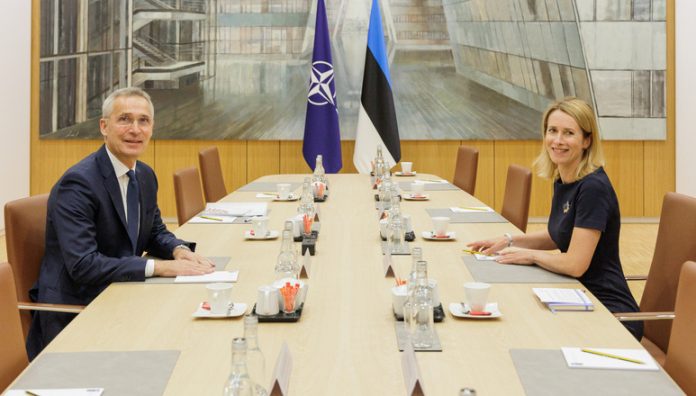Secretary General Jens Stoltenberg welcomed Prime Minister Kaja Kallas of Estonia to NATO Headquarters on Wednesday (28 June 2023) for talks to prepare for the Vilnius Summit.
Addressing last weekend’s mutiny by Wagner mercenaries, Mr Stoltenberg called it “an internal matter for Russia”, but underlined that “it demonstrates once again that President Putin’s illegal war in Ukraine is a big strategic mistake. It has deepened existing divisions and created new tensions in Russia.” At the same time, he cautioned against underestimating Russia, saying: “we must continue to support Ukraine, and we must keep our defence strong.”
The Secretary General said that since 2014, NATO has significantly reinforced its presence and readiness from the Black Sea to the Baltic Sea. This includes a UK-led multinational battlegroup in Estonia – which can be rapidly reinforced up to brigade-strength – as well as fighter jets and air defence from Allies helping to protect Estonian skies. Mr Stoltenberg added that Allies have agreed a new rotational model for air and missile defence, allowing for swift transition from air policing to air defence. “At the Summit, we will take the next steps, with new regional plans, assigned forces and capabilities, and an enhanced exercise programme – all backed by over 300,000 troops on high readiness,” said the Secretary General.
Prime Minister Kaja Kallas said that it is a priority for Estonia to ensure that NATO is a credible and strong collective defence organisation both today and in the long term. “We will only achieve this if, as member states, we all make bigger and long-term investments in our defence and fulfil the political promises made to Ukraine by agreeing in Vilnius on a specific action plan for Ukraine’s NATO membership,” Kallas emphasised.
The Prime Minister explained that in order to achieve lasting peace in Europe, the grey zones of security in Europe must be brought to an end. “I have repeatedly explained that grey zones are the breeding ground for instability and wars. Based on its experience, Estonia can say that NATO membership is the safest, cheapest, and most reliable way to deter Russia,” Kallas said.
Kallas: Ukraine a NATO member
Support for Ukraine will be another top priority for the Summit. Mr Stoltenberg welcomed Estonia’s leading role in providing critical aid and rallying the international community behind the Ukrainian people. He said that at the Summit, Allies will agree a multi-year package of assistance and upgrade political ties with Ukraine, bringing the country “closer to its rightful place in NATO”. Allies are also expected to agree on a more ambitious defence investment pledge, with 2 percent of GDP as a floor, not a ceiling, and the Secretary General praised Estonia for leading by example. He added that the Vilnius Summit will be the first with Finland as a first member, and that work is underway to finalise Sweden’s accession as well. “I have called another meeting of senior officials from Türkiye, Sweden and Finland next Thursday. The time is now to welcome Sweden as a full member of NATO,” he said.
PM Kallas stressed that in order to achieve lasting peace in Europe, Ukraine must become a NATO member after the end of the war. “Allies have already agreed on this at the Bucharest Summit, and it must not remain a hollow promise. We need to establish a practical way for Ukraine to achieve this goal together in Vilnius,” she added.
At the meeting, the Prime Minister also highlighted that in Madrid, the allies made historical decisions that now need to be implemented. “We need to confirm in Vilnius the defence plans of NATO in order to even more effectively secure every centimetre of the NATO territory, right from the start of a potential conflict. Collective defence also needs to be practised regularly and realistically,” Kallas said.
“The threat of Russia is there and it remains. It is our responsibility to explain this to our partners, if necessary. As the threat from Russia is long-term, it is also necessary to make greater efforts across the alliance to strengthen defence capabilities,” Kallas said. The Prime Minister added that Estonia’s defence expenditure will be 3 % of GDP. “We are setting an example for other allies as one of our goals is to reach a NATO defence spending agreement of 2 % of GDP now and 2.5 % of GDP in the long term,” she said.
Finally, the Secretary General addressed the importance of NATO’s KFOR mission in Kosovo, which continues to fulfil its UN mandate impartially. “We call on both parties to refrain from anything that can further escalate tensions, and to return immediately to the EU-facilitated dialogue, which is the only way forward,” he said.

